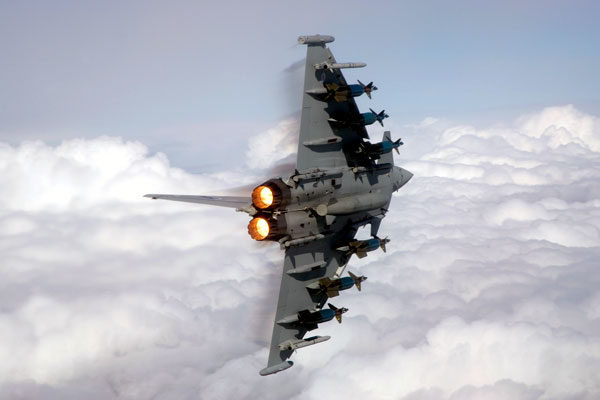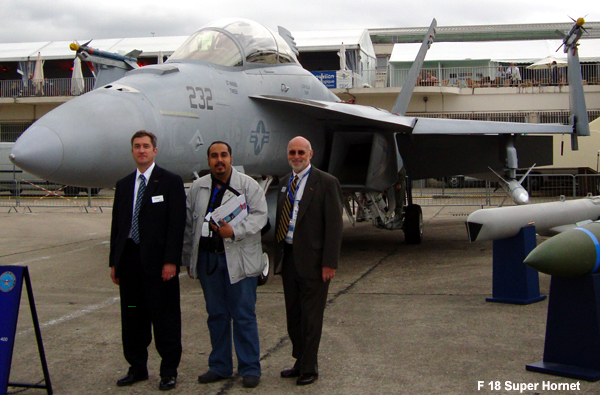|
So far, only the French Dassault’s Rafale appeared
to be in the bidding for an order for 60 aircraft
for the UAE Air Force but a spokesman for Eurofighter
confirmed that the company had received a formal
Request for Proposals (RfP) a few weeks back from
the UAE and that “we are working hard to deliver
a response.”
Who else has been invited is not known but sources
in Lockheed Martin told India
Strategic that the company was in
discussions here “to supply additional aircraft.”
It is not clear if these “additional”
cover a few more, or are the replacement for 60
Mirages that the UAE wants to phase out.
Boeing has also made presentations to the UAE
on its F/A 18 E/F Super Hornet and F 15E Strike
Eagle, but again, there are no firm indications
on whether the RfP has been sent to Boeing also.
Notably, Rafale had completed all the mandatory
flight tests, and discussions were on only to
fix the price. But Deputy Supreme Commander of
the UAE Armed Forces, Shaikh Mohammed bin Zayed
al Nahyan, said at the Dubai Airshow Nov 16 that
Dassault’s proposal was “uncompetitive
and unworkable.”
The French company declined comment.
Eurofighter spokesman though confirmed that the
United Kingdom, one of the four partners in the
Eurofighter project, had made a presentation to
the UAE Air Force on October 17, just a month
back, and after that, the RfP was sent to it.
The other three partners in the consortium are
Germany, Italy and Spain.
It may be noted that while Britain has spearheaded
the Eurofighter sales in the Gulf, including to
Saudi Arabia successfully, the campaign for India
is led by Germany.

It may also be recalled that the UAE had purchased
80 F-16 Desert Falcons from Lockheed Martin, configured
with Active Electronically Scanned Array (AESA)
and other combat radars in 2000. All of them,
designated Block 60 due to specific and exclusive
UAE requirements and which cost nearly 25 to 30
percent more than the US Air Force (USAF)’s
own F 16s, were delivered beginning 2004 for about
US $ 8.5 billion.
UAE had also ordered Mirage 2000, again configured
to its specific requirements and designated Mirage
2000-9, from Dassault in 1998. An older lot was
also converted to the new Dash-9 standards with
new avionics, combat radars and laser pods. Overall,
there are around 60 Mirage aircraft, equipped
with MBDA’s Black Shaheen subsonic cruise
missiles and advanced weapons. Dassault is supposed
to buy these back under its RfP terms, and do
whatever, keep them or sell them.

Diplomatic sources here told this writer that
informal discussions on selling the Mirage 2000-9s
have been held “at the diplomatic level with
India” but that there has been no interest
from New Delhi. Details were not given.
UAE’s F 16 Block 60 is the most advanced
F-16 version, and Lockheed Martin brought these
to India for flight demonstrations for the Indian
Air Force (IAF)’s Medium Multi Role Combat
Aircraft (MMRCA) competition.
IAF has though shortlisted only the Eurofighter
and Rafale, and a decision on the choice is likely
to be announced shortly by the Ministry of Defence
(MoD) which is now considering the financial demands
for the deal from the two companies.
What happens in the UAE should have no bearing
on the Indian MMRCA competition as IAF has already
selected only Rafale and Eurofighter, disqualifying
four others on the basis of number of points scored
in flight and weapon tests. Former Chief of the
Air Staff Air Chief Marshal P V Naik, who had
announced the decision on shortlisting, observed
though that “all the competing aircraft –
US F 16 and F 18, Swedish Gripen and Russian Mig
35 – were good.”
Under the Indian system, IAF has to shortlist
two or three vendors after technical evaluation,
without assigning any grading like Number 1, 2
or 3. The MoD then has to finalise the winner
on the basis of the lowest bidder, designated
L-1 in its jargon, purely on financial implications.
There is a clause in the tender that the Indian
Government can reject a winner on strategic grounds,
but India has good relations with all the countries
whose aircraft were in the fray. And Defence Minister
A K Antony has already stated that the final selection
would be on the basis of technical and financial
merit.

UAE’s decision to seek new bids however has
two implications: 1. That its own selection process
has to start afresh and will take another couple
of years, and 2. The winner in the Indian competition
will have to fine-tune its offer in the final
negotiations but after the selection by the MoD.
|